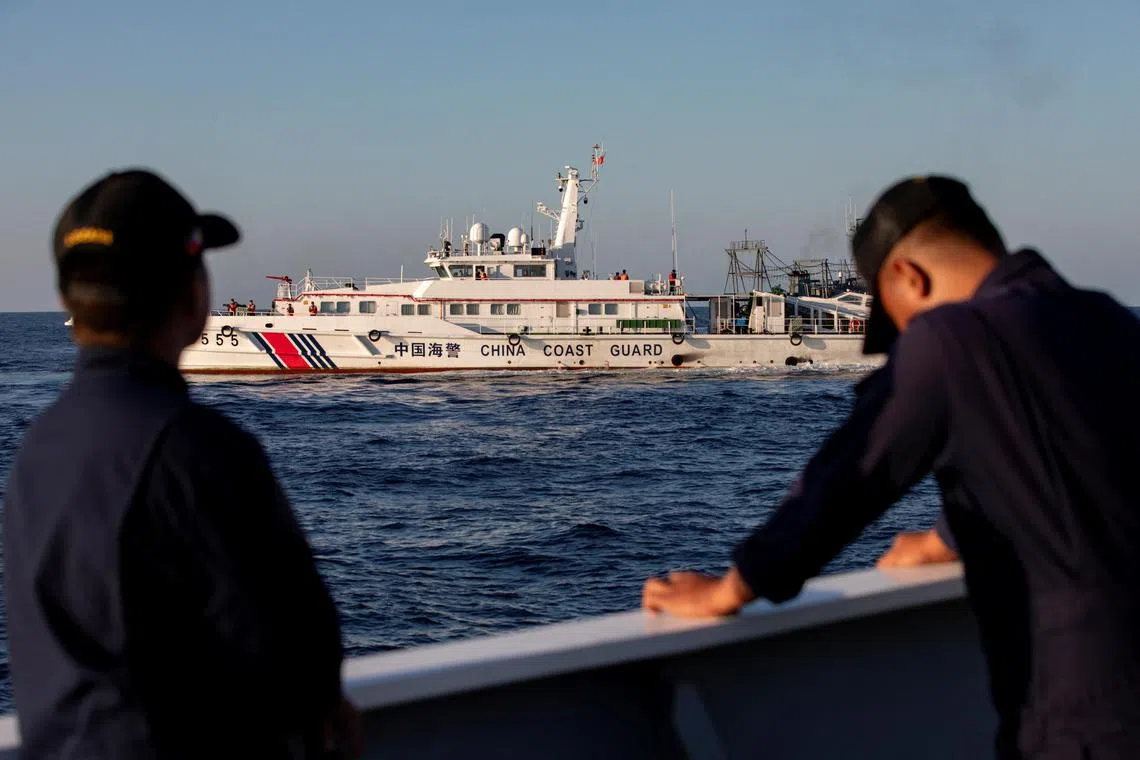Marcos warns on China threat, says he’s ‘not poking the bear’
Sign up now: Get insights on Asia's fast-moving developments

The stand-off between the Philippines and China over a series of contested reefs and islands has become a critical flashpoint in the region.
PHOTO: REUTERS
MANILA - Philippine President Ferdinand Marcos Jr said the threat to his nation from China’s sweeping claims in the South China Sea is growing, but argued that his government’s efforts to assert sovereignty over disputed areas are not meant to start a conflict by “poking the bear”.
“We are trying to keep things on an even keel,” Mr Marcos said on March 19 in an interview with Bloomberg Television’s Haslinda Amin at the presidential palace in Manila.
The challenge, he added, is that “since the threat has grown, we must do more to defend our territory”.
Along with Taiwan, the stand-off between the Philippines and China over a series of contested reefs and islands has become a critical flashpoint in the region.
Since Mr Marcos took office in 2022, the Philippine military and coast guard have ramped up operations to supply troops at a remote outpost and escort fishermen he says have relied on the waters “for generations”.
That stance has sparked condemnation from Beijing, whose armada of fishing boats and coast guard vessels have often blocked Philippine ships and even collided with them
“We have not instigated any kind of conflict. We have not instigated any kind of confrontation,” Mr Marcos, 66, said of his government’s policies. “We are just trying to feed our people.”
But, he added, “China has taken some very aggressive actions against our coast guard”.
During a trip to deliver supplies to its outpost on the Second Thomas Shoal in March, Manila said four Filipino sailors were injured
Reversing the policies of his predecessor, former president Rodrigo Duterte, Mr Marcos has tightened ties with the US military, giving it greater access to Philippine bases and resuming joint sea patrols.
In return, Washington has strongly backed the Philippines when it comes to its efforts in the South China Sea.
The Marcos interview came on the same day US Secretary of State Antony Blinken was visiting Manila.
Ahead of a meeting with Mr Marcos, Mr Blinken criticised what he called Beijing’s “provocative” actions.
Mr Marcos has also strengthened ties with other US allies.
The Philippines upgraded relations with Australia
Mr Marcos said his nation cannot accept China’s vast claims, which Beijing bases on a 1947 map that shows a vague “nine-dash line” sweeping over most of the South China Sea.
A United Nations tribunal in 2016 ruled against Beijing’s claims
Despite the standoff, Mr Marcos emphasised that he has kept talks with Beijing going and that he does not want to be in the position of invoking a mutual defence treaty the Philippines has had with the US for decades.
Asked what might provoke him to utilise that defence accord, Mr Marcos said the Philippines would have to be facing an “existential threat”.
“I hope the time never comes that we have to answer that question,” he said. “When you talk about the mutual defence treaty, to invoke that, actual outright violent conflict, then this is a very, very dangerous, very, very slippery road to go down.” BLOOMBERG


